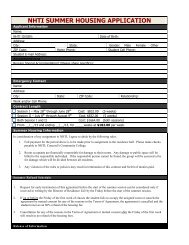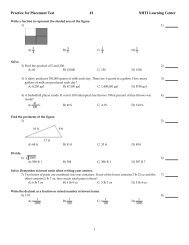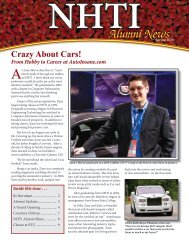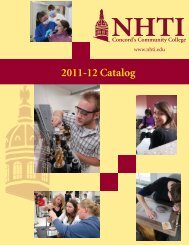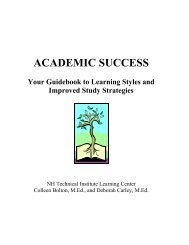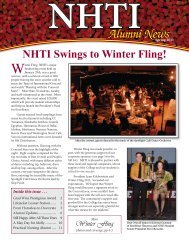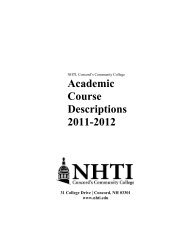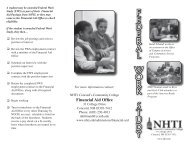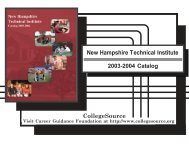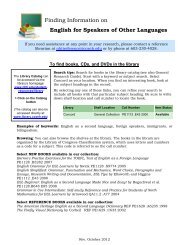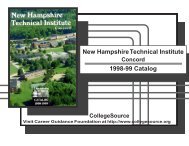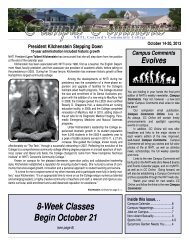Catalog 05-06 - NHTI - Concord's Community College
Catalog 05-06 - NHTI - Concord's Community College
Catalog 05-06 - NHTI - Concord's Community College
- No tags were found...
Create successful ePaper yourself
Turn your PDF publications into a flip-book with our unique Google optimized e-Paper software.
Copyright & Disclaimer Information: Copyright © 1994, 1995, 1996, 1997, 1998, 1999, 2000, 2001, 2002, 2003, 2004, 20<strong>05</strong>, 20<strong>06</strong>, 2007. <strong>College</strong>Source®, Inc. and Career Guidance Foundation. <strong>College</strong>Source® digital catalogs are derivative works owned and copyrighted by <strong>College</strong>Source®, Inc. and Career Guidance Foundation. <strong>Catalog</strong> content is owned and copyrighted by the appropriate school. While <strong>College</strong>Source®, Inc. and Career Guidance Foundation provides information as a service to the public, copyright is retained on all digital catalogs.Copyright & Disclaimer Information: Copyright © 1994, 1995, 1996, 1997, 1998, 1999, 2000, 2001, 2002, 2003, 2004, 20<strong>05</strong>, 20<strong>06</strong>, 2007. <strong>College</strong>Source®, Inc. and Career Guidance Foundation. <strong>College</strong>Source® digital catalogs are derivative works owned and copyrighted by <strong>College</strong>Source®, Inc. and Career Guidance Foundation. <strong>Catalog</strong> content is owned and copyrighted by the appropriate school. While <strong>College</strong>Source®, Inc. and Career Guidance Foundation provides information as a service to the public, copyright is retained on all digital catalogs.Course DescriptionsPS 220 Public Administration 3-0-3This course discusses the growth of the public sector and the methods bywhich this sector can be managed. Topics include public managementtechniques, effective decision-making, civil service, budgeting, publicorganizations, and the politics of public sector administration.PS 231 American Government 3-0-3This course is an introduction to the basic structures of the politicalprocess in the United States. It combines attention to political activity atboth the national (Federal) and the State and local levels. The topicscovered include analyses of the Federal and States’ Constitutions, theAmerican political economy, State/Federal relationships, inter-branchmatters between the Executive, Legislature and Judiciary branches, theelective process, activities of the public and interest groups, and thegovernments’ handling of the public purse.Practical Nursing (PN)All practical nursing courses integrate theory and clinical experience. Failure toreceive a satisfactory grade in either theory OR the clinical experience portion of thecourse will result in a failing grade. All practical nursing major field courses mustbe passed before proceeding to the next level. Those students electing to take the BI195, BI 196, BI 202 sequence instead of BI 107 must earn “Cs” or better in thosecourses to enter or progress in the nursing courses.PN 101 Practical Nursing I 4-12-8This course provides the student with knowledge of fundamental conceptsin communication and helping processes to be utilized within therole of the LPN. Major concepts will be Orem’s self-care theory, thewellness-illness continuum and health care delivery. Students will beintroduced to basic nursing interventions and concepts of nutrition, ethical/legalissues of nursing, and mental health. Simulated clinical laboratoryand clinical experiences will provide opportunities for masteringbasic skills. (Corequisites: BI 107, EN 101 and PY 1<strong>05</strong>) (BI 107 is spreadover two semesters: 5 credits will be earned at the end of the second partof the course pending successful completion of both parts of the course)Students who are taking the BI 195, BI 196, BI 202 sequence instead of BI 107must complete BI 195 by the end of PN 101. A minimum grade of “C” must beearned in BI 195 to progress to PN 102.PN 102 Practical Nursing II 3-15-8This course describes nursing care that promotes wellness in clients throughoutthe lifespan. The nurse, within the LPN role, provides this careutilizing the nursing process. Building on Orem’s universal self-care requirementslearned in Practical Nursing I, the student will be introducedto developmental self-care requirements from conception to old age.Content will include: women and child health, health deviations, andalterations in immune and hematology function. The concepts of pharmacology,nutrition, ethical/legal issues, and mental health will be integratedthroughout the course. Learning opportunities will be provided ina variety of clinical settings to facilitate integration and application oftheoretical knowledge. (Prerequisites: PN 101; satisfactory progress inBI 107; corequisites: BI 107, PY 220) Students who are taking the BI 195, BI196, BI 202 sequence instead of BI 107 must complete BI 102 by the end of PN102. A minimum grade of “C” must be earned in BI 102 to progress to PN 103.PN 103 Practical Nursing III 4-15-9This course describes nursing care for clients who have self-care deficitsassociated with well defined health deviations. The LPN, applying ethicaland legal standards, provides this care via the nursing process. Contentincludes alterations in respiratory, cardiovascular, endocrine, mobility,elimination, neurosensory and gastrointestinal function. The concepts ofpharmacology, nutrition, ethical/legal issues, and mental health will beintegrated throughout the course. Additional topics will include: scopeof practice, licensure, and management skills. Learning opportunitieswill be provided in a variety of clinical settings to facilitate integrationand application of theoretical knowledge. (Prerequisites: PN 101 andPN 102; minimum of “C” or better in BI 107; corequisite: MT 129)Students who are taking the BI 195, BI 196, BI 202 sequence instead of BI 107must complete BI 202 by the end of PN 103. In addition, students must earn aminimum grade of “C” in BI 202 in order to graduate.Project Lead The Way®Project Lead The Way® is an initiative which allows high school students toexplore careers in engineering and engineering technology by completing a sequence ofcourses as part of their high school curriculum. Students who have completed any ofthe courses listed below may be eligible to apply some of these credits to meetrequirements in <strong>NHTI</strong>’s Mechanical Engineering Technology and ManufacturingEngineering Technology programs. Students should consult with the DepartmentHead of Mechanical/Manufacturing Technology to see if credits may be applicable.PLTW 101 Introduction to Engineering Design 4-0-4Students are introduced to the fundamentals of engineering design anddrafting through AutoCAD Inventor, a 3-D solid modeling softwarepackage. Topics include problem-solving techniques, documentation,working drawings, prototyping, and manufacturing considerations. Assumingsuccessful completion, this course may be used to meet the requirement forMC 102 in the Mechanical and Manufacturing Engineering Technology programs.PLTW 102 Digital Electronics 4-0-4The concepts of digital electronics are presented using theory, simulationsoftware, and breadboarding. Topics include basic electricity, Booleanalgebra, gate arrays, and digital-to-analog/analog-to-digital applications.Assuming successful completion, this course may be used to meet the requirement forthe EL 115 Digital Fundamentals course in the Broadband Networking andCommunications Technology program as well as Electronic and Computer EngineeringTechnology programs.PLTW 103 Principles of Engineering 4-0-4A survey of engineering concepts and careers. Topics include ethics,communication, physical principles, and measurement. A portion of thecourse is taught with programmable mechanical breadboarding hardware,allowing construction of operable electromechanical systems.PLTW 104 Computer Integrated Manufacturing 4-0-4An overview of modern manufacturing is presented, from concept toproduct. Students use a variety of software packages to design, model,and produce parts with computer-controlled tools.PsychologyPY 1<strong>05</strong> Introduction to Psychology 3-0-3An introductory college course in psychology which focuses on the fundamentalfacts and principles of psychology within the broader context ofcontemporary personal and social concerns. Topics may include the historicaldevelopment of the discipline, scientific methodology, humandevelopment, motivational theory, consciousness, sensation and perception,learning, thinking, memory, emotions, biological basis of behavior,personality theory, psychopathology, sexuality, and measurements andstatistics. Available in Honors format.PY 2<strong>05</strong> Crisis Intervention 3-0-3This course focuses on the emotional aspects of individuals involved in acrisis situation. Coverage is given to the theory and management of specificsituations such as stress, death and dying, drug abuse, suicide, sexualassault, disasters and violence. Consideration is also given to the functionsand legalities of the mental health system. (Prerequisite: PY 1<strong>05</strong>)PY 209 Educational Psychology 3-0-3Psychological principles are applied to the educational environment. Theoriesof learning, memory, cognition, and behavior management are usedto help the student find an optimal instructional approach. While thiscourse is a distribution requirement for the Associate in Science in Educationprogram it may also be applied to a concentration of courses inPsychology or Social Sciences. (Prerequisite: PY 1<strong>05</strong>)117



